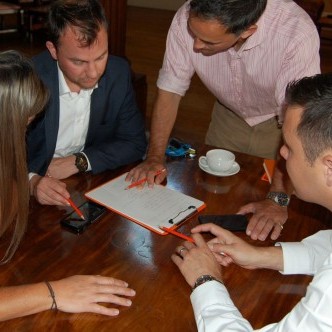What do we mean by strategy development?
 Just like our name at Evocatus consulting, the meaning of “Strategy” has its roots in the classical world. In Ancient Greece, a Strategos was a general, responsible for organising and directing the armed forces of a city state. These Strategoi would plan and organise their forces to protect and promote the interests of their state; success for them was not just found in winning battles or even wars, but in the unhindered prosperity of their City. Over the centuries, the word has evolved from its exclusively military origins to reflect planning and decision-making which is concerned with the ultimate, existential goals of a nation or organisation. We particularly like the way these two definitions apply to the business world:
Just like our name at Evocatus consulting, the meaning of “Strategy” has its roots in the classical world. In Ancient Greece, a Strategos was a general, responsible for organising and directing the armed forces of a city state. These Strategoi would plan and organise their forces to protect and promote the interests of their state; success for them was not just found in winning battles or even wars, but in the unhindered prosperity of their City. Over the centuries, the word has evolved from its exclusively military origins to reflect planning and decision-making which is concerned with the ultimate, existential goals of a nation or organisation. We particularly like the way these two definitions apply to the business world:
“Strategy is a process, a constant adaptation to the shifting conditions and circumstances in a world where chance, uncertainty, and ambiguity dominate.”
Murray & Grimsley in “On Strategy”, 1996
Strategy development is about going beyond the immediate, visible plan. It’s about being ready to cope with complexity and competition, rather than just the linear path to delivering the current project. Planning all too often assumes that the plan will work the way we expect; a strategic approach plans to adjust and adapt to overcome the frictions of the real world.
“Strategy is a plan of action designed in order to achieve some end; a purpose together with a system of measures for its accomplishment.”
J C Wylie in “Military Strategy: A General Theory of Power Control”, 1989
The components of a strategy are Ends, Ways and Means – the objective, the paths to achieve it and the resources required. Although this framework is useful even for very simple tasks, it is essential to framing and understanding the ultimate “Why?” and “How?” of any organisation.
Why should businesses want to invest in strategy development?
Strategic thinking offers different advantages in different scenarios. Strategic approaches to Risk Management put risks into a more useful context by understanding the wider potential opportunities and threats which might not be obvious if the focus is more immediate. Developing a strategic approach can create a sense of pride and purpose in an organisation; by providing a shared framework for coherent collaboration between people, teams and departments, strategic thinking can help to break through stovepipes and build a common corporate ethos; if everybody knows what the business is ultimately for, they can buy into that vision in a way that is simply impossible for an organisation which simply tackles project after project or sale after sale. Finally, investment in strategy development prepares an organisation for the unexpected. Simply recognising that the world is complex and competitive encourages a mindset which expects to be blindsided. The most dangerous assumptions are based in overconfidence; strategic thinking challenges this hubris.
How does playing games improve strategy development?
Strategy is often just a buzzword, used to convey gravitas, importance or seniority; many “strategies” are simply policies which are being promoted as somehow having more value just because of the additional label. We are not interested in hollow labels or lending gravitas – we are much more interested in helping whole organisations develop their strategic thinking and incorporate it into everything they do, in order to be more resilient, more coherent and more competitive. We believe that playing the right, often bespoke, games is the best way to learn about strategy and to understand the power of strategic thinking, particularly when the whole team is involved.
The first reason is that we make sure that everyone understands that games are there to be played. In this environment, where it is safe to fail, there will be real challenges and surprises which teams will have to respond to together; these responses are a part of the game this time, but prepare all the players for the moment when a decision could have real impact on the business. Games are designed and run to be engaging and inclusive; by learning about the team, and their strengths and weaknesses, leaders gain a better understanding of what means they have available. They might also use a game to rehearse a plan, or to test it against a range of possible circumstances. Not all of this is about managing risk but can also be about preparing to recognise fleeting opportunities when they arise. Playing games encourages a mindset which recognises that plans need to be able to adapt and develop in changing circumstances. By having to react to unforeseen events and by challenging assumptions, we can help teams to recognise and unpick problematic thinking, such as confirmation bias and groupthink, both of which are factors in the overconfident, linear planning and decision-making which is the opposite of strategic. Organising and taking part in games like these not only demonstrates across the business that managers are committed to developing strategic thinking, but explains through activity and engagement why it is important and relevant for everyone in the business.
At Evocatus we offer Strategy Development across the South West, Oxfordshire, and London from our base near Bath. If your company is interested in Strategy development and you think we can help then please contact us.
